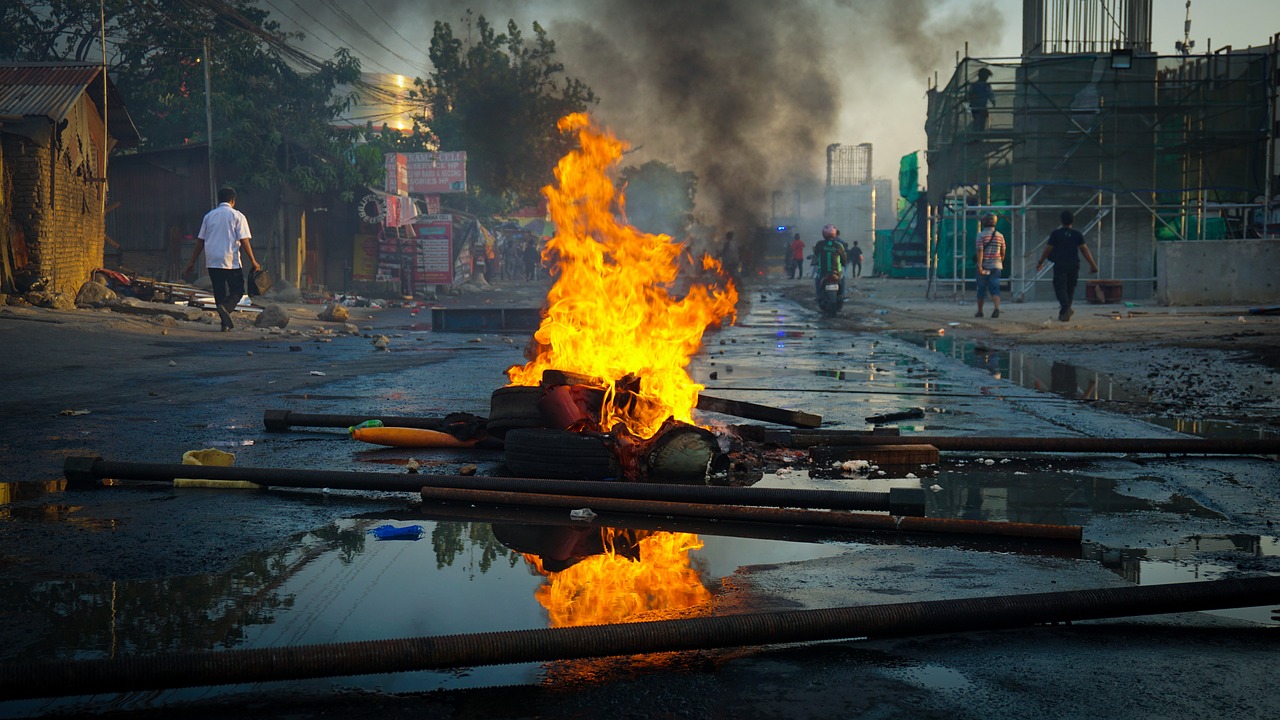The French Revolution - Causes and Effects
Exploring the historical events leading to the French Revolution and analyzing its significant impacts on society, politics, and culture in France and beyond.
Examining the social and economic factors such as inequality, poverty, and taxation that fueled discontent among the French populace.
Discussing the political climate in France, including the absolute monarchy, the Estates-General, and the influence of Enlightenment ideas.
Detailing the grievances of the Third Estate, comprising the commoners, against the privileged First and Second Estates.
Exploring how Enlightenment philosophies of liberty, equality, and fraternity inspired revolutionary sentiments among the French people.
Analyzing key events like the Storming of the Bastille, the Women's March on Versailles, and the Declaration of the Rights of Man and of the Citizen.
Examining the radical phase of the revolution marked by mass executions, led by the Committee of Public Safety under Robespierre.
Exploring the rise of Napoleon Bonaparte and the transformation of France into an empire, impacting Europe and shaping modern warfare.
Reflecting on the enduring legacy of the French Revolution on modern democracy, nationalism, and human rights movements worldwide.
Stay tuned for answers to common queries about the French Revolution!

Socio-Economic Causes
Exploring the historical events leading to the French Revolution and analyzing its significant impacts on society, politics, and culture in France and beyond.
Examining the socio-economic factors that played a crucial role in igniting the flames of revolution in France. The society of pre-revolutionary France was deeply divided, with a stark contrast between the privileged nobility and clergy, and the impoverished commoners. The **inequality** was glaring, as the nobles and clergy enjoyed lavish lifestyles and exemptions from taxes, while the common people struggled to make ends meet under heavy taxation and economic hardships. The burden of financing the extravagant spending of the monarchy fell heavily on the shoulders of the lower classes, exacerbating their discontent and resentment towards the ruling elite.
Furthermore, **poverty** was rampant among the commoners, with many living in dire conditions, struggling to feed their families and facing harsh economic realities. The feudal system, with its archaic practices and oppressive structures, further deepened the economic woes of the lower classes. The growing economic disparities between the different estates created a powder keg of social unrest that eventually exploded in the form of the French Revolution.
The issue of **taxation** also played a pivotal role in fueling the revolutionary fervor. The tax system in France was highly regressive, with the burden falling disproportionately on the lower classes, while the nobility enjoyed tax exemptions and privileges. This unfair distribution of tax obligations added fuel to the fire of discontent among the common people, who saw themselves shouldering the financial burdens of the state while the elite escaped unscathed.
Discussing the political climate in France, including the absolute monarchy, the Estates-General, and the influence of Enlightenment ideas.
Detailing the grievances of the Third Estate, comprising the commoners, against the privileged First and Second Estates.
Exploring how Enlightenment philosophies of liberty, equality, and fraternity inspired revolutionary sentiments among the French people.
Analyzing key events like the Storming of the Bastille, the Women's March on Versailles, and the Declaration of the Rights of Man and of the Citizen.
Examining the radical phase of the revolution marked by mass executions, led by the Committee of Public Safety under Robespierre.
Exploring the rise of Napoleon Bonaparte and the transformation of France into an empire, impacting Europe and shaping modern warfare.
Reflecting on the enduring legacy of the French Revolution on modern democracy, nationalism, and human rights movements worldwide.
| Causes | Effects |
|---|---|
| Socio-Economic Factors | Deepened social divides and sparked revolutionary sentiments. |
| Political Climate | Undermined the absolute monarchy and paved the way for revolutionary changes. |
Now, let's delve deeper into the socio-economic causes that set the stage for one of the most transformative events in history, the French Revolution.

Political Instability
Exploring the historical events leading to the French Revolution and analyzing its significant impacts on society, politics, and culture in France and beyond.
Examining the social and economic factors such as inequality, poverty, and taxation that fueled discontent among the French populace.
Discussing the political climate in France, including the absolute monarchy, the Estates-General, and the influence of Enlightenment ideas.
The political instability in France during the pre-revolution period was characterized by a deeply entrenched absolute monarchy that wielded immense power, often at the expense of the common people. The Estates-General, a representative assembly comprising the clergy, nobility, and commoners, faced challenges in addressing the grievances of the populace adequately. The Enlightenment ideas of thinkers like Voltaire and Rousseau challenged the traditional authority of the monarchy and laid the groundwork for revolutionary change.
Detailing the grievances of the Third Estate, comprising the commoners, against the privileged First and Second Estates.
Exploring how Enlightenment philosophies of liberty, equality, and fraternity inspired revolutionary sentiments among the French people.
Analyzing key events like the Storming of the Bastille, the Women's March on Versailles, and the Declaration of the Rights of Man and of the Citizen.
Examining the radical phase of the revolution marked by mass executions, led by the Committee of Public Safety under Robespierre.
Exploring the rise of Napoleon Bonaparte and the transformation of France into an empire, impacting Europe and shaping modern warfare.
Reflecting on the enduring legacy of the French Revolution on modern democracy, nationalism, and human rights movements worldwide.

Rise of the Third Estate
The was a pivotal moment in the lead-up to the French Revolution, where the common people, known as the Third Estate, rose against the oppressive feudal system dominated by the nobility and clergy. This estate comprised the vast majority of the French population, including peasants, artisans, and the bourgeoisie, who were burdened with heavy taxes and lacked political representation.
Driven by growing discontent and inspired by Enlightenment ideals of equality and liberty, the Third Estate demanded social and political reforms to end the privileges enjoyed by the nobles and clergy. Their grievances were exacerbated by economic hardships, as they struggled to make ends meet while the upper classes lived lavishly.
The Third Estate played a crucial role in the revolutionary events, particularly during the convening of the Estates-General in 1789. Frustrated by the unequal voting system that favored the First and Second Estates, the Third Estate declared itself the National Assembly, signaling a direct challenge to the existing power structures.
As tensions escalated, the storming of the Bastille in July 1789 symbolized the defiance of the Third Estate against royal authority and marked the beginning of widespread unrest across France. The subsequent formation of the National Constituent Assembly paved the way for radical changes in French society and politics.
Through their defiance and resilience, the Third Estate catalyzed the revolutionary spirit that ultimately led to the downfall of the monarchy and the birth of a new era in French history. Their struggles and sacrifices laid the foundation for the principles of modern democracy and social equality that continue to resonate today.

Impact of Enlightenment
The Enlightenment, a period of intellectual and philosophical growth in the 18th century, had a profound impact on the French Revolution. The ideas of thinkers like Voltaire, Rousseau, and Montesquieu promoted concepts of individual rights, reason, and the questioning of traditional authority. These Enlightenment ideals challenged the existing social and political structures in France, inspiring the people to demand change and equality.
Enlightenment principles such as liberty, equality, and fraternity became rallying cries for the revolutionaries, fueling their passion for reform and revolution. The belief in the inherent rights of all individuals and the rejection of absolute monarchy laid the foundation for the revolutionary spirit that swept through France.
Moreover, the Enlightenment emphasized the importance of education, reason, and critical thinking, which empowered the common people to question the oppressive practices of the monarchy and aristocracy. The spread of Enlightenment ideas through literature, salons, and pamphlets created a fertile ground for revolutionary thought to take root.
As a result, the Impact of Enlightenment on the French Revolution cannot be overstated. It provided the intellectual framework and moral justification for challenging the status quo and advocating for a more just and equitable society. The legacy of the Enlightenment continues to influence modern concepts of democracy, human rights, and the rule of law.

Events Leading to Revolution
The period leading up to the French Revolution was marked by a series of significant events that ultimately sparked the revolutionary fervor among the French populace. One of the most iconic events was the Storming of the Bastille on July 14, 1789, symbolizing the beginning of the revolution and the people's defiance against the monarchy. The fall of the Bastille not only represented the overthrow of a symbol of royal authority but also signified the demand for change and the end of tyranny.
Another pivotal moment was the Women's March on Versailles in October 1789, where thousands of women marched to the Palace of Versailles to demand bread and protest against the monarchy's lavish lifestyle. This event highlighted the growing influence of the common people in shaping the course of the revolution and put pressure on the royal family to address the needs of the impoverished population.
The Declaration of the Rights of Man and of the Citizen, adopted in August 1789, was a defining moment in the revolution as it enshrined the principles of liberty, equality, and fraternity as the foundation of the new French society. This document laid out the fundamental rights of all citizens and marked a significant shift towards a more egalitarian and democratic system.
These events, along with others like the abolition of feudal privileges and the establishment of a constitutional monarchy, set the stage for further radical changes and paved the way for the Reign of Terror and the eventual rise of Napoleon Bonaparte. The events leading to the revolution were a culmination of social, political, and economic grievances that had been brewing for years, ultimately reshaping the course of French history and leaving a lasting impact on the world.

Reign of Terror
During the Reign of Terror, the French Revolution took a dark and violent turn as the revolutionaries sought to defend the Republic from internal and external threats. This period, spanning from 1793 to 1794, was characterized by extreme measures taken to protect the revolution and purge perceived enemies of the state. Led by the Committee of Public Safety, headed by Maximilien Robespierre, the Reign of Terror saw a wave of executions through the use of the guillotine, with thousands losing their lives, including King Louis XVI and Queen Marie Antoinette.
The Reign of Terror aimed to suppress counter-revolutionary activities and maintain control over the revolutionary government. The Law of Suspects was enacted, allowing for the arrest of anyone suspected of opposing the revolution, leading to widespread fear and paranoia. The revolutionary tribunals operated swiftly, often convicting individuals based on flimsy evidence or mere suspicion of dissent.
The Reign of Terror also witnessed the emergence of revolutionary fervor and radical ideologies, with the rise of groups like the Jacobins who advocated for more extreme measures to safeguard the revolution. The period was marked by a climate of suspicion and betrayal, as individuals turned on their neighbors and associates to avoid being labeled as enemies of the state.
Despite its brutal methods, the Reign of Terror did succeed in consolidating power for the revolutionary government and quelling internal dissent. However, the excessive violence and loss of life during this period tarnished the reputation of the revolution both domestically and internationally. The Reign of Terror came to an end with the fall of Robespierre in July 1794, leading to a period of relative stability known as the Thermidorian Reaction.

Napoleonic Era
The Napoleonic Era, also known as the Age of Napoleon, marked a significant period in French and European history characterized by the rise of Napoleon Bonaparte to power and the transformation of France into an empire. Napoleon, a military genius and charismatic leader, seized control of France through a coup d'état in 1799, effectively ending the chaos of the French Revolution. His rule brought stability and centralized authority to a war-torn nation, earning him the title of Emperor in 1804.
Under Napoleon's leadership, France experienced a series of military conquests that expanded its influence across Europe. The Napoleonic Wars, fought between France and various coalitions of European powers, reshaped the political landscape of the continent. Napoleon's innovative military tactics, such as the use of mass conscription and rapid maneuver warfare, revolutionized the art of war and influenced military strategies for decades to come.
Furthermore, the Napoleonic Code, a comprehensive system of laws introduced by Napoleon, modernized legal systems in France and many conquered territories. The code promoted principles of equality before the law, protection of property rights, and secularism, laying the foundation for legal reforms in Europe and beyond.
Napoleon's ambitious vision extended beyond military conquests and legal reforms. He implemented significant administrative and economic reforms aimed at modernizing France and promoting economic growth. Infrastructure projects, such as the construction of roads, bridges, and canals, improved transportation and communication networks, facilitating trade and commerce.
Despite his military successes and domestic reforms, Napoleon's aggressive expansionist policies eventually led to his downfall. The disastrous invasion of Russia in 1812 and the defeat at the Battle of Waterloo in 1815 marked the end of the Napoleonic Era. Napoleon was exiled to the remote island of Saint Helena, where he spent the remainder of his life in exile until his death in 1821.
The Napoleonic Era left a lasting impact on Europe and the world, shaping modern warfare, legal systems, and governance structures. Napoleon's legacy as a military strategist and reformer continues to be studied and debated by historians, reflecting the complex and multifaceted nature of his rule.

Legacy and Global Influence
Reflecting on the enduring legacy of the French Revolution, its global influence extends far beyond the borders of France. The revolution's principles of liberty, equality, and fraternity have inspired countless movements for democracy and human rights worldwide. The French Revolution served as a catalyst for the spread of nationalist ideologies, igniting the flames of independence in colonies and territories under imperial rule.
Furthermore, the revolution's impact on modern warfare cannot be understated. The Napoleonic Era witnessed the rise of Napoleon Bonaparte, whose military conquests reshaped the political landscape of Europe. The innovative tactics and strategies employed by Napoleon's armies set new standards for warfare, influencing military doctrines for generations to come.
Moreover, the French Revolution laid the foundation for modern democratic governance. The Declaration of the Rights of Man and of the Citizen established the fundamental rights of individuals and served as a model for subsequent declarations and constitutions around the world. The revolutionary fervor that swept through France in the late 18th century reverberated across continents, inspiring oppressed peoples to rise up against tyranny and fight for their freedom.
In conclusion, the legacy of the French Revolution endures as a testament to the power of revolutionary ideas and the enduring quest for freedom and equality. Its global influence continues to shape the course of history, reminding us of the transformative impact that a single event can have on the world stage.
Frequently Asked Questions
- What were the main causes of the French Revolution?
The French Revolution was primarily sparked by socio-economic factors such as inequality, poverty, and high taxation that created discontent among the population. Political instability, including the absolute monarchy and the grievances of the Third Estate, also played a significant role in fueling the revolution.
- How did Enlightenment ideas influence the French Revolution?
The Enlightenment philosophies of liberty, equality, and fraternity inspired revolutionary sentiments among the French people. These ideas challenged the existing social and political structures, leading to demands for reform and ultimately contributing to the outbreak of the revolution.
- What were some key events during the French Revolution?
Key events during the French Revolution include the Storming of the Bastille, the Women's March on Versailles, and the Declaration of the Rights of Man and of the Citizen. These events symbolized the people's struggle against oppression and marked significant turning points in the revolution.
- What was the Reign of Terror?
The Reign of Terror was a period of radical violence and mass executions during the French Revolution. It was led by the Committee of Public Safety under Robespierre, aiming to suppress counter-revolutionary activities and maintain control through fear and intimidation.
- How did the French Revolution impact modern society?
The French Revolution had a profound impact on modern society by shaping concepts of democracy, nationalism, and human rights. It inspired revolutionary movements worldwide and laid the foundation for modern political ideologies and social reforms.



















